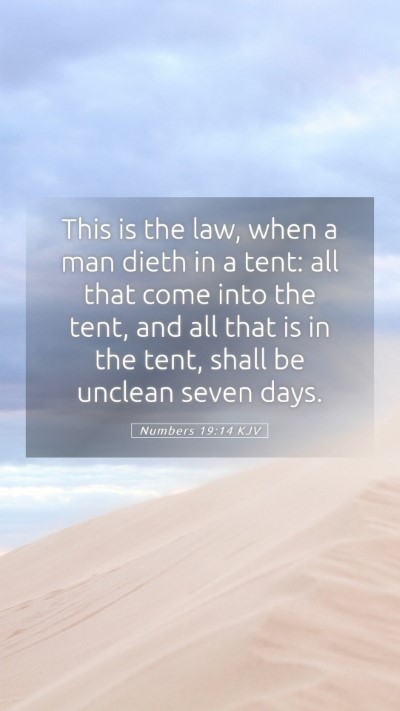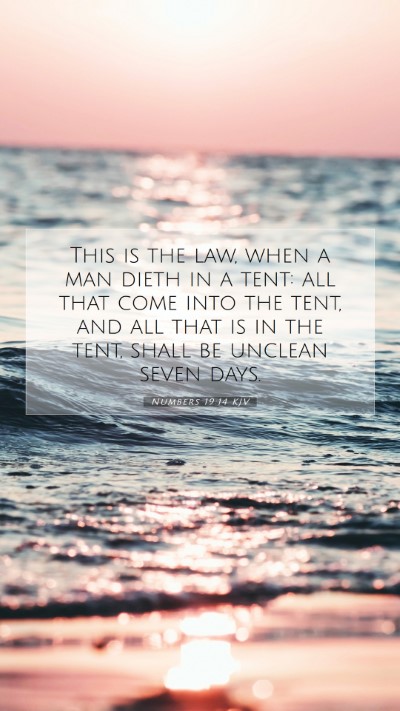Understanding Numbers 19:14
Numbers 19:14 states, "This is the law when a man dies in a tent: All who come into the tent and all who are in the tent shall be unclean seven days." This verse forms part of the laws regarding purity and uncleanness that the Israelites were instructed to follow. The verse imparts significant insights regarding spiritual and ceremonial cleanliness, which are essential themes throughout the Bible. Below, we will explore the meaning of this verse using commentary from several notable theologians.
Bible Verse Explanations
Understanding Scripture often involves exploring the meanings and interpretations provided by various commentaries. In this case, the verse deals with the purification laws that relate directly to death, signifying the impact of death as a source of uncleanness.
Matthew Henry’s Commentary
Matthew Henry emphasizes the seriousness of death and the importance of ceremonial cleanliness. He notes that death introduces a level of uncleanness that requires purification rituals. This ceremonial law reinforces the idea that God's people are called to be holy and separate from death’s defilement. Furthermore, Henry points out that the uncleanness caused by death is temporary but serves to remind the people of their need for atonement and the eventual resurrection.
Albert Barnes’ Commentary
Albert Barnes offers insights into the practical application of this law. He explains that this regulation was crucial for maintaining the sanctity of worship among the Israelites. Death is viewed as a significant spiritual disruption, and entering a space where death has occurred necessitates a purification process to restore oneself to a state of worship. Barnes also highlights the broader implications for how the Israelites were to deal with situations of death in their communal life.
Adam Clarke’s Commentary
Adam Clarke delves into the historical context surrounding this verse. He explains that the tent represents a place of dwelling not just for the living but also for the deceased. Clarke notes that the stipulations were designed to show respect for the dead, while also maintaining the holiness required during the worship of God. His commentary suggests that these laws reflect God's desire for His people to approach Him with a clean heart, symbolically represented through physical cleanliness.
Application of the Verse
Numbers 19:14 holds profound applications for understanding how death influences both the physical and spiritual spheres of life. It calls believers to reflect on the nature of death, its implications, and the call to maintain holiness in their lives. Here are some ways to apply this teaching:
- Spiritual Reflection: Consider how you approach situations of loss and grieving within your community and the impact on your spiritual life.
- Community Support: Engage with Bible study groups to address themes of death and life, providing support and understanding to one another.
- Ceremonial Practices: Reflect on the importance of rituals in your faith life that honor death and the deceased.
Cross References
To gain a better understanding of Numbers 19:14, consider these related Bible verses:
- Leviticus 11:44-45: Discusses holiness and the call to be cleansed.
- Hebrews 9:22: Emphasizes the connection between blood and purification.
- 1 Corinthians 15:54-57: Reflects on victory over death through resurrection.
Conclusion
In conclusion, Numbers 19:14 invites readers to explore the biblical themes of purity, holiness, and the significant impact of death in community life. By engaging in scripture analysis and biblical exegesis through various commentaries, believers can deepen their understanding of God’s law regarding cleanliness and its spiritual implications. These insights can inform personal practices of faith and foster deeper community relationships as one navigates the complexities of life, death, and worship.


